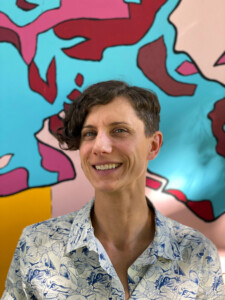
Nicole Williams
Mariel Hemingway is noted for saying, “Nothing in nature lives for itself. Rivers do not drink their own water. Trees do not eat their own fruit. The sun does not give heat for itself, and flowers do not spread fragrance for themselves.” This penchant for helping others drives ESF alumna Nicole Williams ’05, too.
“People help others and organizations in lots of ways and for lots of very personal reasons,” said Williams. “I help those who can’t help themselves, because they need help to survive.”
Animals and the planet fall into this category, which is what brought Williams to ESF in 2001.
“I spent four of the best years of my life at ESF,” said Williams. “I formed my values at ESF. That’s where I learned how important the environment and conservation really are.”
During her studies, she met mentor and future supervisor, the late Alan Rabinowitz, from the Big Cat Conservation Program at the Wildlife Conservation Society (WCS) when he was a guest lecturer on campus. As she listened to Rabinowitz, Williams pictured herself working with the cats at WCS. At the time, she was a sophomore studying environmental and forest biology with aspirations to practice zoological veterinary medicine. The presentation had all the right elements — animals, the environment and conservation — and led to a full-time position with the WCS, housed at the Bronx Zoo, from 2005 to 2007. Here Williams fine-tuned her vision on the dichotomy between zoos and natural habitats.
“Conservation programs at zoos have an important role,” Williams said, who grew up playing in swamps catching frogs and insects. “They dedicate much effort to ensuring diversity of genes. These captive breeding programs help to ensure people can enjoy and learn about a wide variety of species. But these animals will never be wild. My experience with WCS helped me realize I’m most interested in the on-the-ground approach that will help solve problems found at the intersection of human/wildlife interactions: people who live with lions that kill their cattle and watch jaguars take both their livestock and their livelihood. These are the issues I think about.”
“I spent four of the best years of my life at ESF. I formed my values at ESF. That’s where I learned how important the environment and conservation really are.” Nicole Williams
In 2007 Williams, Rabinowitz, and several other colleagues left the WCS to form Panthera, the only organization in the world devoted exclusively to the conservation of the world’s 40 wildcat species and their ecosystems, according to Panthera’s website. Williams served as a program officer at Panthera for five years.
“I loved it,” Williams recalls. “The work the scientists and support staff do at Panthera is transformational and crucial for our planet and the preservation of our ecosystem.”
Williams learned numerous lessons at Panthera, one being that everyone on the team is important — including administrators.
“A piece of my soul yearns to be a program manager and to be on the front line of pivotal discoveries,” Williams said. “I now know that behind every scientist, every program manager is a team of administrators. For the researcher to be successful, the numbers have to work. Every aspect of the organization has to be in sync to realize the mission.”
She used this knowledge as she made her next career move: opening Five Stride Skate Shop in New York City with her soulmate, Drew. “Leaving the 9-to-5 world, leaving Panthera, becoming an entrepreneur were life-defining decisions,” Williams said.
Williams applied the skills from the skate shop to her current position as the finance and business manager for Ocean Outcomes, a nonprofit organization that works for healthy aquatic ecosystems, a plentiful and profitable wild seafood supply, and thriving fishing communities. Williams said that the organization’s mission aligns with her vision for a healthier planet.
“I do the books at the skate shops, so my skills were transferable to the position at Ocean Outcomes,” said Williams. She and Drew now live in Portland, Oregon, and have opened a second skate shop. “Sometimes our lives go in a different direction than we imagine, but we always find our way.”
Sports has always been the one constant in William’s life. She started ice skating when she was six and was a member of Syracuse University’s synchronized figure skating club team. Although she wore soccer cleats for a few seasons, her real love has always been skating, which made the transition from blades to wheels fairly easy. When she was a newcomer to New York City in 2005, she needed something to do outside of work and turned to sports once again. This time, she found roller derby.
“It fits my personality,” said Williams, who is now in her 15th season with roller derby, holds seven championships, has represented America in international play, and is known on the circuit as Bonnie Thunders. “I like competition and sports; I need to be active, and roller derby allows me to
be part of the community – something team-oriented with a lot of spirit.”
The inspiration behind her track name, she said, is Johnny Thunders, an American guitarist, singer-songwriter and member of the New York Dolls, who is one of her favorite musicians. Johnny and Bonnie rhyme, and Thunders “just sounds good,” she said.
Stephanie Specchio is the associate vice president of communications and marketing at ESF


